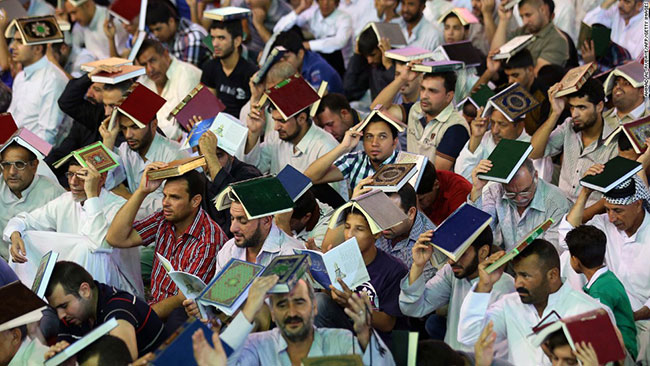
There are various aspects associated with fasts and they also possess numerous physical and spiritual benefits. These tend to have a great impact upon man – the most important of them being their ethical aspect and their educative philosophy.
Some of their important benefits are that they make man’s soul kind, strengthen his determination and moderate his instincts.
When an individual fasts, despite his hunger and thirst, he must stay away from food, water and sexual pleasures and prove practically that he is not an animal within a stable, but an entity that can rein in his wild soul and overcome his lust and carnal desires.
In fact, the most important philosophy of fasting is this spiritual effect; man, who has a variety of food and drinks at his disposal and can reach out for them the moment he experiences thirst or hunger, is like the trees that grow near the rivers, seeking support of the walls of the gardens. These fondled and pampered trees possess less resistance and are short-lived. If water does not reach them for a few days they immediately dry up and wither away. In contrast, the trees which grow between the rocks on the mountains or in the deserts and which are pampered from their incipience by strong storms, scorching rays of the sun and harsh winters, and are deprived of luxuries, are strong, durable and highly resistant!
Fasts act in a similar way with man’s soul, granting it – in exchange for temporary restrictions – a strong determination, steadfastness, and the ability to face up to hardships and severe occurrences. Since it controls the unruly instincts, it makes man’s heart pure and luminous.
In short, fasts heave man out of the world of animals and elevate him into the realm of angels, and the expression:
لَعَلَّكُمْ تَتَّقُونَ
“…so that you may guard (against evil).”
in verse 183 of Suratul Baqarah1, while mentioning the philosophy behind the fasts, also bears an allusion to all of the above realities.
The well-known tradition:
الصَّوْمُ جُنَّةٌ مِنَ النَّارِ.
“The fast is a shield against the fire (of Hell)”2 is also a reference to this issue.
In another tradition from Imam ‘Ali (a.s) we read that some companions asked the Noble Prophet (s.a.w): “What should we do to keep the Satan away from us?” He (s.a.w) replied: “Fasting blackens the face of the Satan; charity in the way of Allah breaks his back; befriending someone for the sake of Allah and persevering in performing good deeds cuts his roots and seeking forgiveness severs the vein of his heart.”
In Nahjul Balagha, while explaining the philosophy of the various acts of worship, the Commander of the Faithful (a.s), says regarding fasting:
وَ الصِّيَامَ ابْتِلاَءً لِإِخْلاَصِ الْخَلْقِ.
“Allah ordered the observance of fasts for fostering (the attribute of) sincerity within the people).”3
In another tradition of the Noble Prophet (s.a.w), we read:
إِنَّ لِلْجَنَّةِ بَاباً يُدْعَى الرَّيَّانَ لاَ يَدْخُلُ مِنْهُ إِلاَّ الصَّائِمُونَ.
“Paradise has a door by the name of ‘Rayyan’ (the sated one) and none shall enter Paradise through it except those who fast.”
The late Sheikh Saduq, explaining this tradition in his book Ma’ani al-Akhbar, says: “The reason for selecting this particular name for this door of Paradise is that the maximum inconvenience suffered by people who fast is caused by thirst; when they pass through this door, they shall be quenched in a manner that they shall never experience any thirst ever again.”4
The Social Effects of Fasting
The social effects of fasts are evident. Fasts impart the message of equality amongst the individuals of the society. By acting upon this religious obligation the affluent ones not only get first hand experience of the hunger of the hungry and the impoverished ones of society, but economizing on their daily food also serves to benefit them.
Yes, it is possible to draw the attention of the affluent ones towards the state of the hungry and the deprived ones by describing their conditions to them, but if this aspect were to be experienced physically, the effects would be all the more noticeable. The fasts provide a personal experience to this important social issue.
It is for this reason that it has been narrated that when Hisham b. Hakam sought to know the reason for the legislation of fasting, Imam as-sadiq (a.s) replied: “Fasting has been made obligatory in order to establish equality between the rich and the poor; the rich experience the pangs of hunger and thus fulfil their obligations with respect to the poor.
Usually, the rich can attain whatever they covet; Allah desires that there exists equality between His servants thereby making the rich experience hunger, pain and trouble so that they may exhibit mercy upon the hungry and the destitute.”5
If the wealthy nations of the world were to fast for just a few days in the year and experience the pangs of hunger, would there still exist any hungry people in the world?
The Medical and Curing Effects of Fasting
The miraculous effect of abstinence (from food) in curing various diseases has been established in modern as well as ancient medicine. It is a fact which just cannot be denied and one would be hard pressed to find a doctor who does not refer to this fact in the course of his writings. We all know that the cause of a great number of diseases is extravagance in the consumption of various types of food.
This is because the unabsorbed components either accumulate in the form of obtrusive fat particles at various locations within the body, or remain within the blood stream as fat and surplus sugar. These superfluous components, between the muscles of the body, are in fact the perfect breeding grounds for microbes and infectious diseases. In this state, the best way to combat these diseases is to do away with these breeding grounds by means of abstinence (from food) and fasting! Fasting burns away the refuse and thus cleanses the body.
In addition, it also provides a noticeable and vital respite to the digestive system and serves as an effective factor in tuning-up this process, especially in the light of the fact that this structure is the most sensitive of all the systems of the body and one which is in a state of continuous operation all throughout the year.
It is clear that, as taught by Islam, the one who fasts should not exhibit extravagance in consuming food during sahar6 and iftar7, in order that he derives the maximum benefit medically, otherwise, it is possible that the results might have a negative effect.
Alexis Sophorin, the Russian scientist, writes in his book: “Treatment by means of fasting possesses special benefits and is useful for curing anaemia, weakness of the intestines, acute and chronic inflammation, internal and external abscesses, tuberculosis, sclerosis, rheumatism, gout, dropsy, sciatica, (peeling of the skin), diseases of the eyes, sugar disorders, skin diseases, kidney and liver problems, and other diseases.”
The abovementioned diseases are not the only ones that can be treated by means of abstinence of food, rather diseases that are associated with the very foundation of the body and are intertwined with its very cells, such as cancer, syphilis, tuberculosis and plague can also be treated by this means.8
In a well-known tradition, the Noble Prophet (s.a.w) says:
تَصُومُوا تَصِحُّوا.
“Fast, in order that you become healthy.”9
In another well-known tradition, he (s.a.w) says:
أَلْمِعْدَةُ بَيْتُ كَلِّ داَءٍ وَ الْحَمِيَّةُ رَأْسُ كُلِّ دَواَءٍ.
“The stomach is the house of all maladies and abstinence (from food) is the best of all cures.”10,11
————————————————————
1. يا أَيُّهَا الَّذِينَ آمَنُوا كُتِبَ عَلَيْكُمُ الصِّيامُ كَما كُتِبَ عَلَى الَّذِينَ مِنْ قَبْلِكُمْ لَعَلَّكُمْ تَتَّقُونَ (Tr.)
2. Bihar al-Anwar, vol. 96, Verse 256
3. Nahj al-Balagha, saying 252
4. Bihar al-Anwar, vol. 96, pg. 252
5. Wasa`il ash-Shia, vol. 7, the first chapter of The Book of Fasts, pg. 3
6. The time before beginning the fast. (Tr.)
7. The time of breaking the fast. (Tr.)
8. Ruzeh: Rawish-e-Nuween Baraai Darmaan-e-Bimaarihaa, pg. 65 (First edition)
9. Bihar al-Anwar, vol. 96, pg. 255
10. Ibid., vol. 14
11. Tafsir-e-Namunah, vol. 1, pg. 628
 [su_heading size=”19″]The Social Effects of Fasting[/su_heading]
[su_heading size=”19″]The Social Effects of Fasting[/su_heading]


